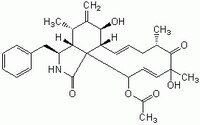250255 Sigma-AldrichCytochalasin D, Zygosporium mansonii - CAS 22144-77-0 - Calbiochem
Cytochalasin D, Zygosporium mansonii, CAS 22144-77-0, is a fungal toxin that is about 10-fold more potent than cytochalasin B in inhibiting actin filament function. Blocks cytoplasmic division.
More>> Cytochalasin D, Zygosporium mansonii, CAS 22144-77-0, is a fungal toxin that is about 10-fold more potent than cytochalasin B in inhibiting actin filament function. Blocks cytoplasmic division. Less<<Produits recommandés
Aperçu
| Replacement Information |
|---|
Tableau de caractéristiques principal
| CAS # | Empirical Formula |
|---|---|
| 22144-77-0 | C₃₀H₃₇NO₆ |
Products
| Référence | Conditionnement | Qté | |
|---|---|---|---|
| 250255-1MG | Flacon en verre | 1 mg |
| Description | |
|---|---|
| Overview | Cell-permeable fungal toxin. About 10-fold more potent than cytochalasin B in inhibiting actin filament function. Does not inhibit monosaccharide transport across cell membranes. Inhibits cytoplasmic division by blocking the formation of contractile microfilaments. Inactivates low conductance K+ channels. Also modulates CD4 cross-linking in T lymphocytes and increases intracellular Ca2+ levels. Exhibits antitumor activity. Also available as a 10 mM solution in DMSO (Cat. No. 504776). |
| Catalogue Number | 250255 |
| Brand Family | Calbiochem® |
| Product Information | |
|---|---|
| CAS number | 22144-77-0 |
| ATP Competitive | N |
| Form | White solid |
| Hill Formula | C₃₀H₃₇NO₆ |
| Chemical formula | C₃₀H₃₇NO₆ |
| Reversible | N |
| Structure formula Image | |
| Quality Level | MQ100 |
| Applications |
|---|
| Biological Information | |
|---|---|
| Primary Target | Actin filament function |
| Purity | ≥98% by TLC |
| Physicochemical Information | |
|---|---|
| Cell permeable | Y |
| Dimensions |
|---|
| Materials Information |
|---|
| Toxicological Information |
|---|
| Safety Information according to GHS | |
|---|---|
| RTECS | GZ4850000 |
| Product Usage Statements |
|---|
| Packaging Information |
|---|
| Transport Information |
|---|
| Supplemental Information |
|---|
| Specifications |
|---|
| Global Trade Item Number | |
|---|---|
| Référence | GTIN |
| 250255-1MG | 07790788048952 |
Documentation
Cytochalasin D, Zygosporium mansonii - CAS 22144-77-0 - Calbiochem FDS
| Titre |
|---|
Cytochalasin D, Zygosporium mansonii - CAS 22144-77-0 - Calbiochem Certificats d'analyse
| Titre | Numéro de lot |
|---|---|
| 250255 |
Références bibliographiques
| Aperçu de la référence bibliographique |
|---|
| Sasaki, H., et al. 1995. Proc. Natl. Acad. Sci. USA 92, 2026. Blankson, H., et al. 1995. Exp. Cell Res. 218, 522. Melamed, I., et al. 1995. Biochem. Biophys. Res. Commun. 209, 1102. Verschueren, H., et al. 1995. Eur. J. Cell Biol. 66, 335. Aszalos, A., et al. 1994. Cell Immunol. 157, 81. Wang, W.H., et al. 1994. Am. J. Physiol. 267, F592. Betina, V., and Micekova, D. 1972. Chem. Abstr. 77, 160508q. Katagiri, K., and Matsuura, S. 1971. J. Antibiot. 24, 722. |
Citations
| Titre | |
|---|---|
|
|














